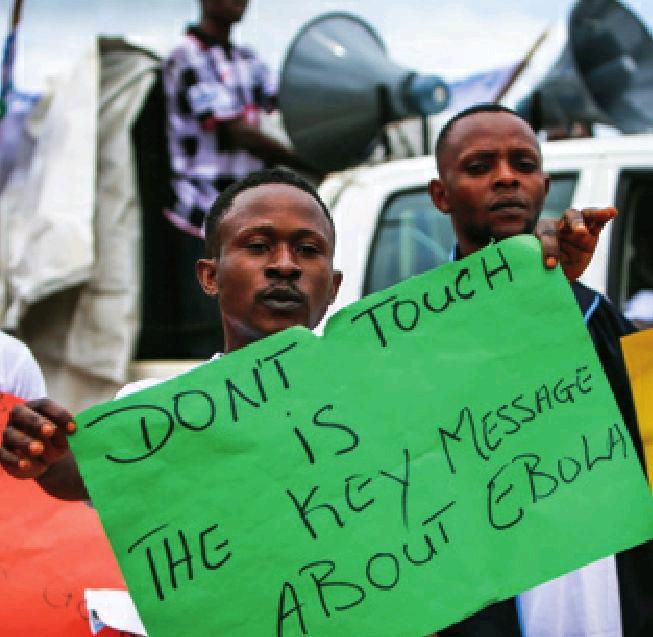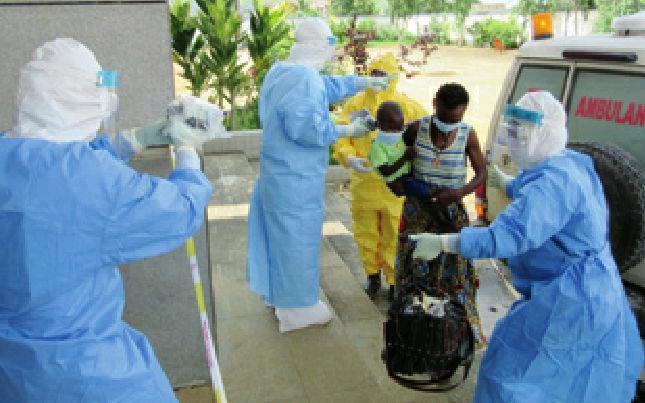An Endemic Effort
2014-11-10ByYuLintao
By+Yu+Lintao
Following a succession of confirmed secondary infection cases of Ebola out of the African continent, the deadly virus is more likely to constitute a global crisis. By October 21, three medical workers—two in the United States and one in Spain—had contracted the disease after treating patients from Africa in their hospitals.
Talking on the phone on October 14, U.S. President Barack Obama and UN Secretary General Ban Ki-moon stressed the urgent need for the international community to take concrete measures “to provide the personnel, equipment and supplies required to stop the epidemic at its source.”
An underestimated risk
Since the outbreak of the Ebola epidemic in February, more than 4,800 people had died of the disease in three hardest-hit countries of Guinea, Liberia and Sierra Leone, according to the World Health Organization (WHO) on October 19. Furthermore, the epidemic appears to be outpacing efforts to fight it.
Reports from Xinhua News Agency said that in Monrovia, capital of Liberia, no one shakes hands, while an elbow bump is used sparingly for greetings, with most people preferring not to make any physical contact at all. Radio stations are airing popular songs about Ebola, and conversations between locals are largely dominated by Ebola-related news. Local people are also taking a highly cautious approach to handling dead bodies.
Prior to the latest outbreak, the Ebola epidemic had mainly been confined to Africa. The virus therefore did not arouse adequate attention until it recently invaded Europe and North America. The neglect occurred in part because Ebola is highly infectious with a high fatality rate and a short incubation period, which reduces its risk of far-distance spreading. For the past four decades, most victims of the virus have been Africans, leaving the international community largely unwilling to devote the significant amount of funds needed to research and develop vaccines.
Tao Yong, a consultant for Chinese emagazine Far & Wide Journal and a long-term observer of African issues, said that since the Ebola virus was discovered in Africa about 40 years ago, it has long been seen as a local albeit malignant disease. Thus most developed countries with the ability to develop vaccines or specific medicines showed little interest in doing so—an attitude suggesting it was “none of their business,” commented Tao, who has lived in Africa for a long time.
Though some volunteers, international and non-governmental organizations have made laudable efforts in fighting the disease, their endeavors appeared weak in face of the relentless epidemic.
When the epidemic first broke out this year in West Africa, most countries kept a waitand-see attitude, leaving the vulnerable African countries to fend for themselves. Only the Economic Community of West African States allocated $250,000 for Ebola virus treatment in the region. Due to the lack of funding, only 18 percent of Ebola patients in Liberia are being cared for in hospitals or other settings that reduce the risk of transmission by isolating them from the rest of the population. Most countries merely took measures such as monitoring travelers movements and issuing travel advisories.
Although President Obama warned previously that if the United States didnt act there could be a long-term threat to homeland security, the country seemed ill-prepared to deal with the virus.
Thomas Eric Duncan, the patient with the first case of Ebola diagnosed in the United States, who came from Liberia, died on October 8. Only after the countrys first secondary infection case was confirmed—when a nurse participating in the treatment of Duncan was reported to have contracted Ebola—did panic begin to grip the United States. According to a recent poll by The Washington Post, two thirds of U.S. citizens are suffering from “Fear-bola,” worrying that they themselves will catch the virus.
Tao believed that the panic in the United States is understandable. He said that people in the country previously supposed they were “immune” to the virus due to its remoteness and the sound healthcare system. When the country was found to be vulnerable to the deadly epidemic, gloomy sentiments naturally began to spread among Americans. In a globalized world, any virus infection could reach any part of the globe through air travel, Tao noted.
Meanwhile in China, the Chinese Government has put large amounts of human, material and financial resources to help diseaseaffected countries since the early stage of the epidemic outbreak. However, public awareness of the disease is still very low in the country. Chinas health authorities also warned recently of a heightened risk of the epidemic in the country and ordered an upgrade of prevention mechanisms nationwide.
Extensive impacts
The WHO warned in mid-October that the number of new Ebola cases in West Africa could reach 5,000 to 10,000 per week by early December, adding that this health crisis is unparalleled in modern times and the gravity of the situation is difficult to get across with just a few statistics.
The International Monetary Fund (IMF) has expressed caution over the epidemics potential adverse effects on the global economy. A recent IMF report noted that the dire situation in underdeveloped Guinea, Liberia, and Sierra Leone is exacting a heavy human and economic toll. In Sierra Leone, for example, the estimated growth rate for this year has been downsized from 11 percent to 3 percent.
According to the report, the epidemic might bring disastrous consequences for West African economies, which could also affect the growth of some emerging economies that have close economic connections with the region.
More seriously, the disease could potentially deal a heavy blow to West Africas agricultural sector, resulting in a region-wide famine. About 40 percent of farmers in Sierra Leone have given up farming due to the epidemic. In wartorn Liberia, the epidemic may drag the country back to instability. Observers warned that the crisis has pushed society to the brink of collapse. In the face of the broad presence of Ebola, the unstable economy and poor national healthcare system have led to high levels of domestic discontent, risking new civil unrest.
Encouragingly, with growing awareness of the potentially worldwide threat posed by Ebola, the international community is taking more concrete steps.
UN Secretary General Ban recently appealed to the international community to provide $1 billion to help meet the target of reducing Ebolas transmission rate by December 1.
When attending the Asia-Europe Meeting Summit in Milan, Italy, Chinese Premier Li Keqiang announced on October 16 that China would provide at least 100 million yuan ($16 million) in additional aid to help West Africa fight the deadly epidemic.
Prior to the latest assistance, China had offered the embattled Africa a total of 234 million yuan ($38 million) in aid to confront the Ebola epidemic since April. The Chinese Government has also sent medical supplies and medical experts to affected countries. Now, a third batch of Chinese medical experts has arrived in Guinea to work with local medical workers to contain the disease.
President Obama has authorized the U.S. Department of Defense to call up armed forces to active duty to help combat the spread of Ebola in West Africa. In early October, the Pentagon announced that it would deploy 4,000 military engineers and medical personnel to assist with West Africas Ebola control efforts.
With the incoming boost of international assistance, encouraging news is being reported: In some treatment centers in the three worst-hit countries, patients are receiving the care they need. In several locations, community-based programs are yielding promising results.
After taking effective measures to prevent new infection cases over a specified time frame, less-affected Senegal and Nigeria were declared free of Ebola by the WHO on October 17 and 20, respectively.
There is still a long way to go before the international community brings the Ebola crisis well under its control. To this end, concerted world efforts are required simply because Ebola as a disease is so dangerous that even a brief delay could have exponential ramifications, said a Xinhua commentary.
